2026 Complete VCE Education.
All rights reserved
Our hub of information
Blog Posts
The latest student interviews, exam techniques, and resources.
Looking for a complete catalogue of our free resources? Click here
Looking for a complete catalogue of our free resources? Click here
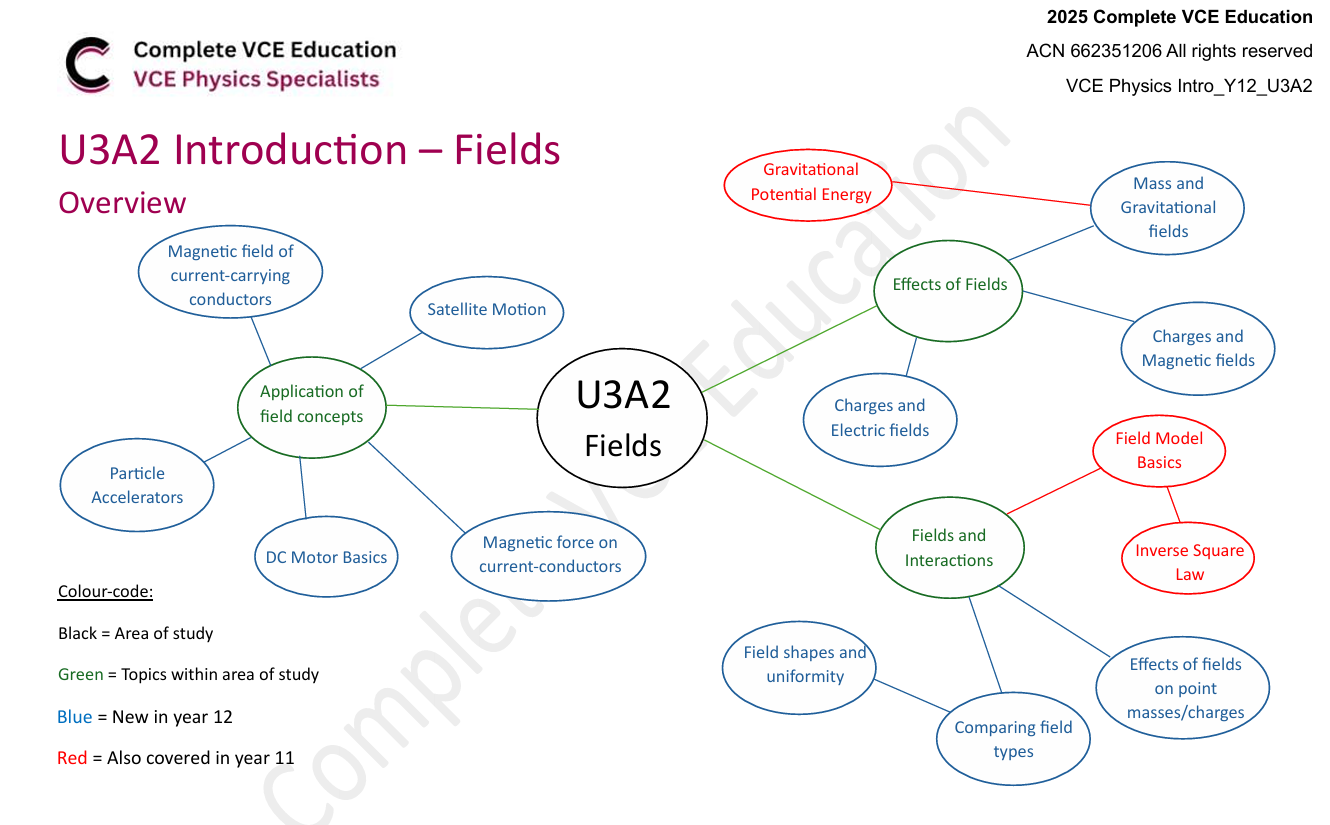
VCE Resources - AOS Materials
VCE Physics Unit 3 AoS 2 Resources - Fields Introduction
Finding fields frustrating? Simply want a head-start advantage? Look no further than our tailor-made, free introduction to Unit 3 Area of Study 2 - Fields, written by our expert VCE Physics tutors!

Student Stories and Insights
Interview with 99.90 ATAR Complete VCE Education Graduate (2023)
Looking for tips and tricks from the best? Look no further than this interview with one of our own Complete graduates of 2023, currently studying Monash Medicine!
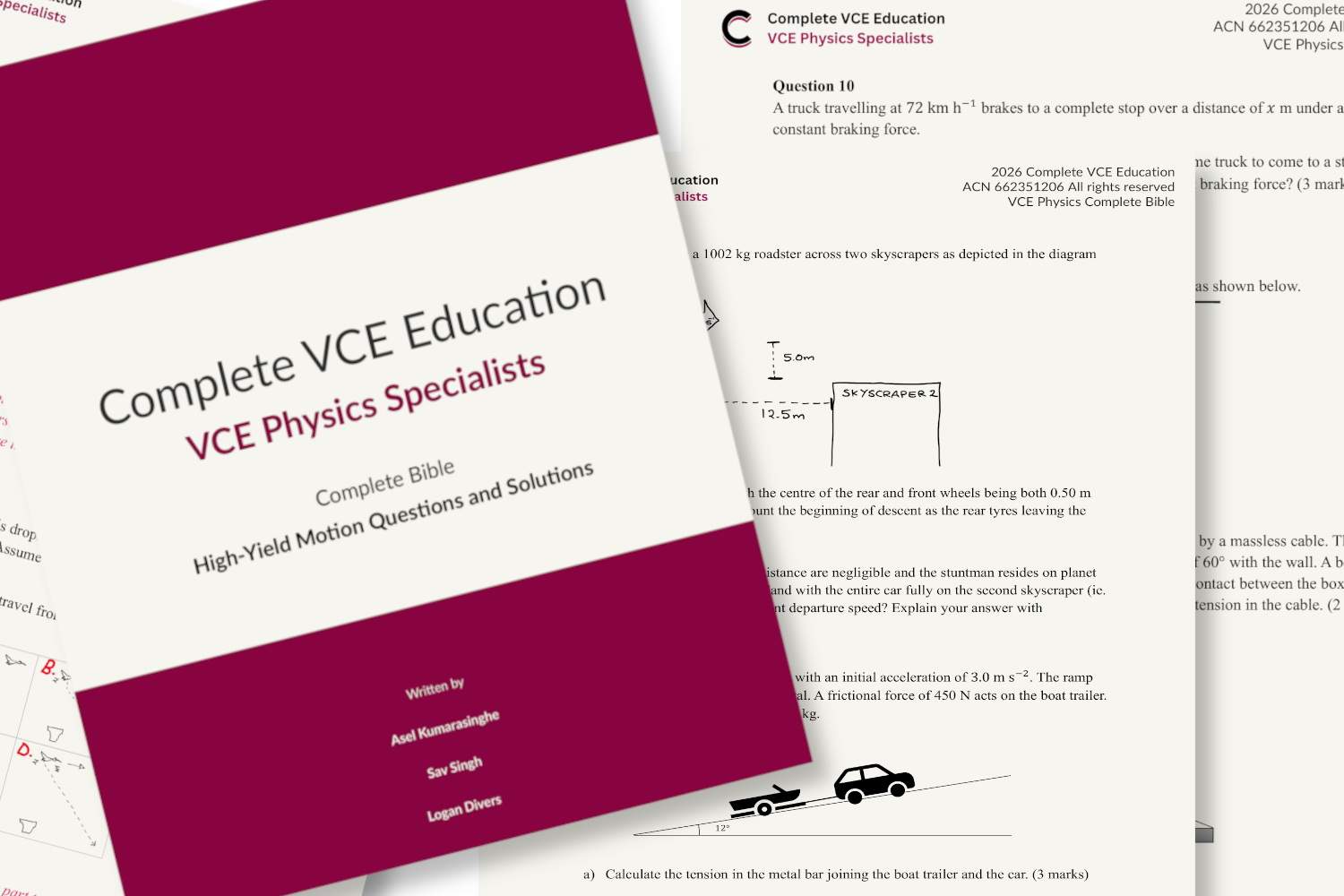
VCE Resources - Samples
Complete Bible - FREE VCE Physics Motion/Kinematics Resource
Want to be rank 1 for the first Year 12 VCE Physics SAC? Looking to revise for your Unit 2 Motion SAC? The Complete Bible has you covered.

Student Stories and Insights
Mastering Motion: Four Tricky Pitfalls for even the Best Students studying U2A1 and U3A1
Motion can be a tough topic covering a wide range of bases - but what are the most common mistakes even this subject's brightest students can make? Read this blog to learn more about the errors you may very well be familiar with in this Area of Study.
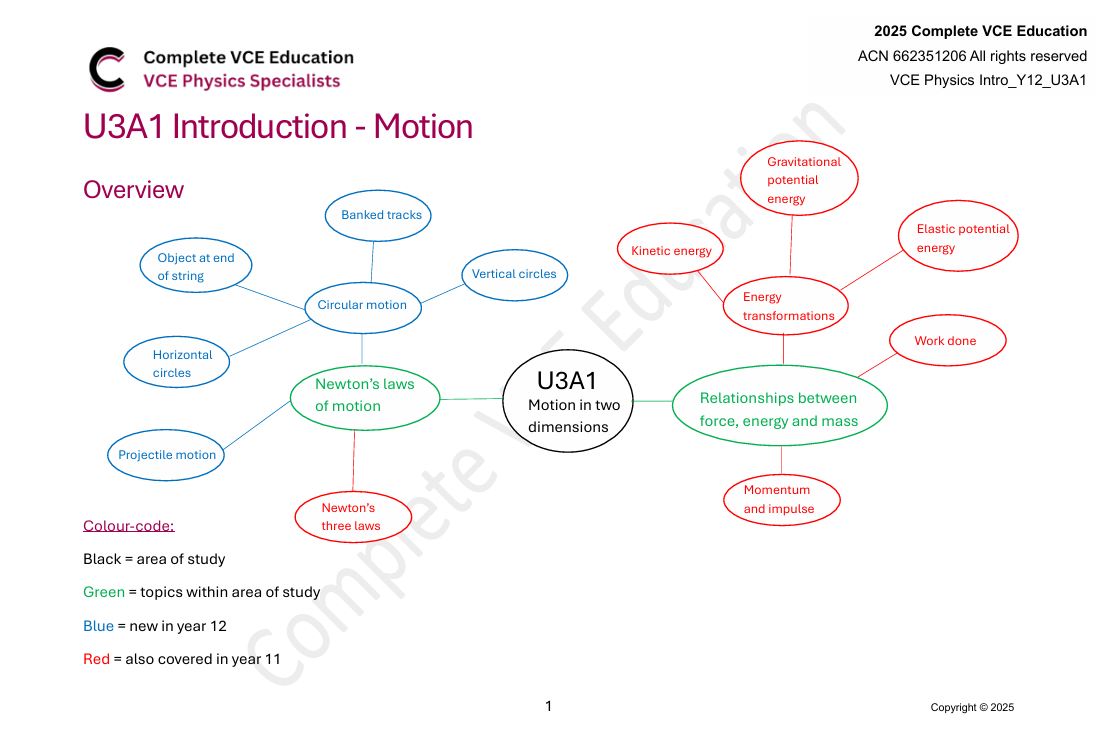
VCE Resources - AOS Materials
VCE Physics Unit 3 AoS 1 - Motion Introduction
Are you making a mess of motion? Our completely free, comprehensive introduction to U3A1 created by expert tutor Asel can help guide your way through this extensive topic.
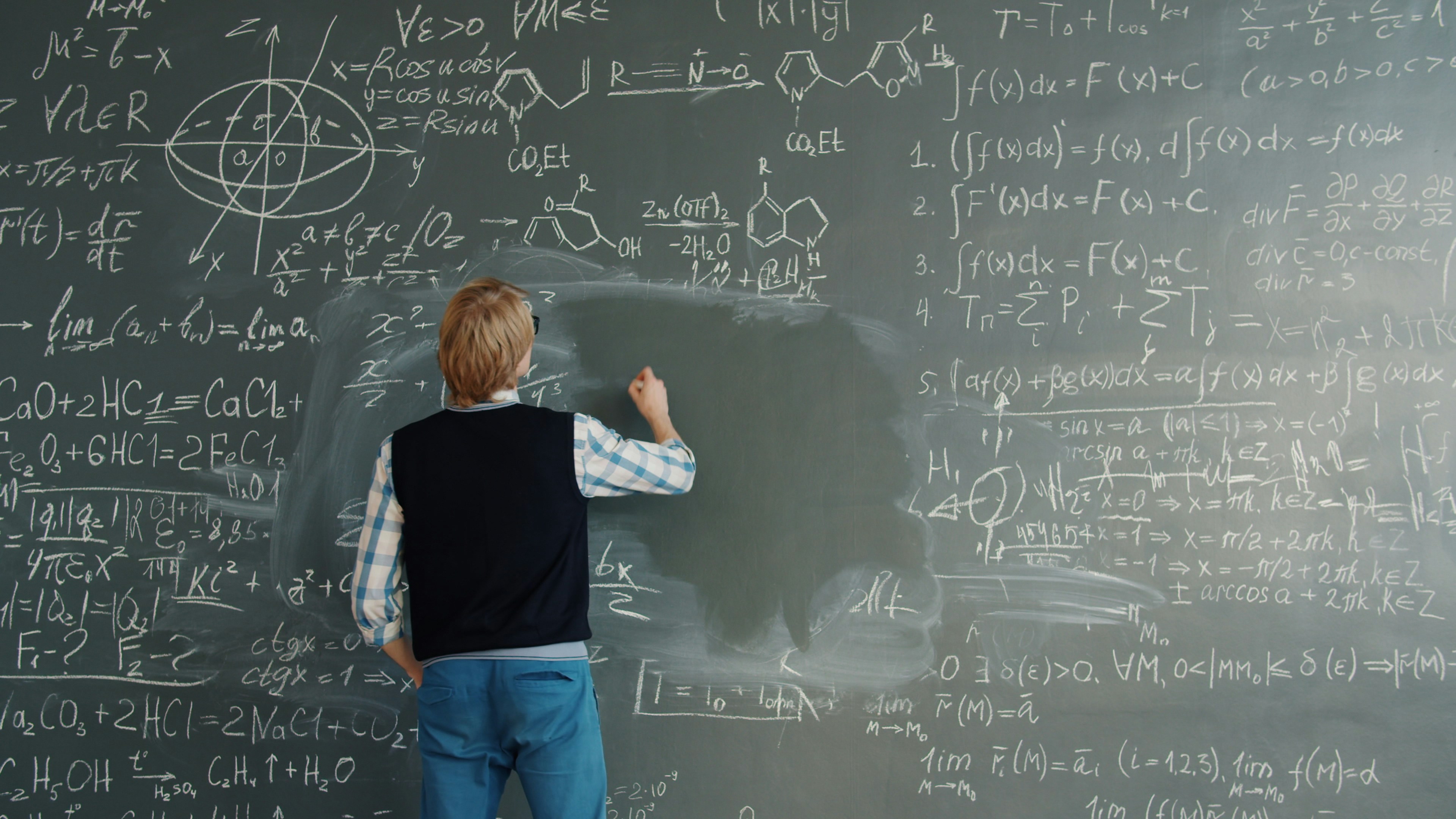
Student Stories and Insights
How to Succeed in VCE Physics: 3 Major Challenges Solved
These are the three most common challenges we see students struggle with - and our advice on how to overcome them!
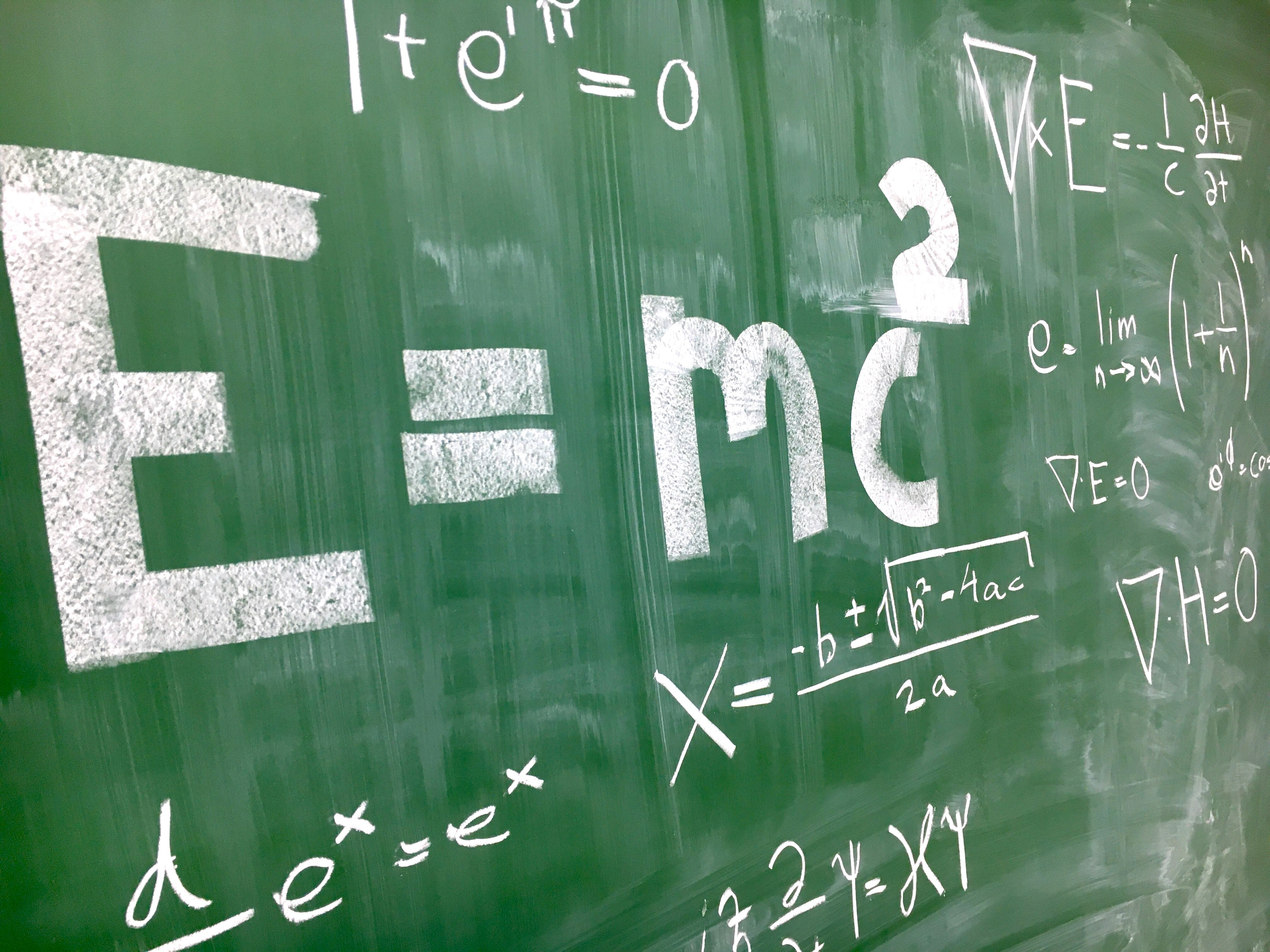
Student Stories and Insights
Is VCE Physics for me? A Guide for Year 10 Students:
Considering signing up for VCE Physics in Year 11? Here's everything you need to know about pathways, requirements and skills, all packed into this singular blog!

VCE Resources - AOS Materials
VCE Physics Unit 4 AoS 1 Light, Matter and Special Relativity: Essential Revision Materials
Puzzled by the dual wave-particle nature of light and matter? Bewildered by the fact that length and time can be different for different observers? Our detailed U4A1 introduction, summary, formula sheet and diagnostic quizzes, crafted by expert tutors Asel, Logan and Sav, will help illuminate these complex concepts.

VCE Resources - AOS Materials
VCE Physics Unit 2 AoS 1 - Motion and Mechanics: Full Summary
Forces leaving you baffled? Torque getting your head spinning? Our free U2A1 summary crafted by expert tutors Asel and Logan can help reinforce these concepts, empowering you with the tools needed to tackle the most complex motion application questions.

Student Stories and Insights
Four Mistakes That Can Kill a Perfect VCE Physics SAC or Exam – And How to Fix Them
Want to avoid common exam traps in VCE Physics (Year 12)? From misused constants to running out of time, this guide breaks down four critical mistakes that can cost you marks — and shows you exactly how to fix them. Perfect for SACs, practice papers, and the final exam.

VCE Resources - Practicals
How to Master the VCE Practical Investigation: A Complete Guide
Master your VCE Physics Scientific Investigation SAC (Year 11 & Year 12) with our complete guide. From forming a hypothesis to designing experiments, analysing errors, and building your poster, this step-by-step resource simplifies every stage — perfect for Physics, Chemistry, or Biology.

VCE Resources - AOS Materials
VCE Physics Unit 1 AoS 2 - Nuclear Physics Full Summary Notes
Struggling with VCE Physics Unit 1 Area of Study 2: Nuclear Physics (Year 11)? From radioactive decay to nuclear stability and fission, our free summary notes simplify every key concept — perfect for revising or building your own cheat sheet.

VCE Resources - AOS Materials
VCE Physics FREE Resources - Unit 3 AoS 2 Fields: Summary Sheet, Cheat Sheet, and Formula Sheet
Download free VCE Physics Unit 3 Area of Study 2 (Fields) SAC prep resources here (Year 12). From field lines to the inverse square law, our notes clarify key concepts in gravitational, electric, and magnetic fields — ideal for mastering U3A2 and preparing your own cheat sheet.

VCE Resources - AOS Materials
VCE Physics FREE Resources - Unit 3 AoS 1 Motion: Diagnostic Quiz
VCE Physics Resources - Unit 3 AoS 1 Motion: Diagnostic Quiz.

VCE Resources - Samples
VCE Physics FREE Resources: U3A1 Motion Differentiator Question. Can you solve this difficult Q?
A glimpse at the challenging "differentiator questions" we use in our enrichment class - tailored towards high-achieving students.

VCE Resources - AOS Materials
VCE Physics FREE Resources - Unit 3 AoS 1 Motion. Cheat Sheet, Formula Sheet and AOS Summary Notes
Confused by kinematics? Struggling to apply Newton’s laws? Not sure which equation to use? We've got you covered.

VCE Resources - Challenging Concepts
VCE Physics - The Michelson-Morley Experiment Explained
VCE Physics - A full explanation of the famous "failed experiment" accompanying our YouTube video on the same.

Student Stories and Insights
Preparing for VCE Physics over the Holidays
How to make the most out of the holidays to set yourself up for success

Student Stories and Insights
2024 VCE Physics Study Design Change - Essential Insights
2024 VCE Physics Study Design Change - Essential Highlights

Student Stories and Insights
How I scored 99.95 & perfect 50/50 in VCE Physics
VCE is tough. It requires hard work, perseverance and an unwavering motivation to succeed.

Student Stories and Insights
How I Scored a Raw 48 in VCE Physics
Physics is a subject of perseverance, a true test of how many times one can figure out that you need to find the change in momentum, or repeating Lenz’s law for the thousandth time....
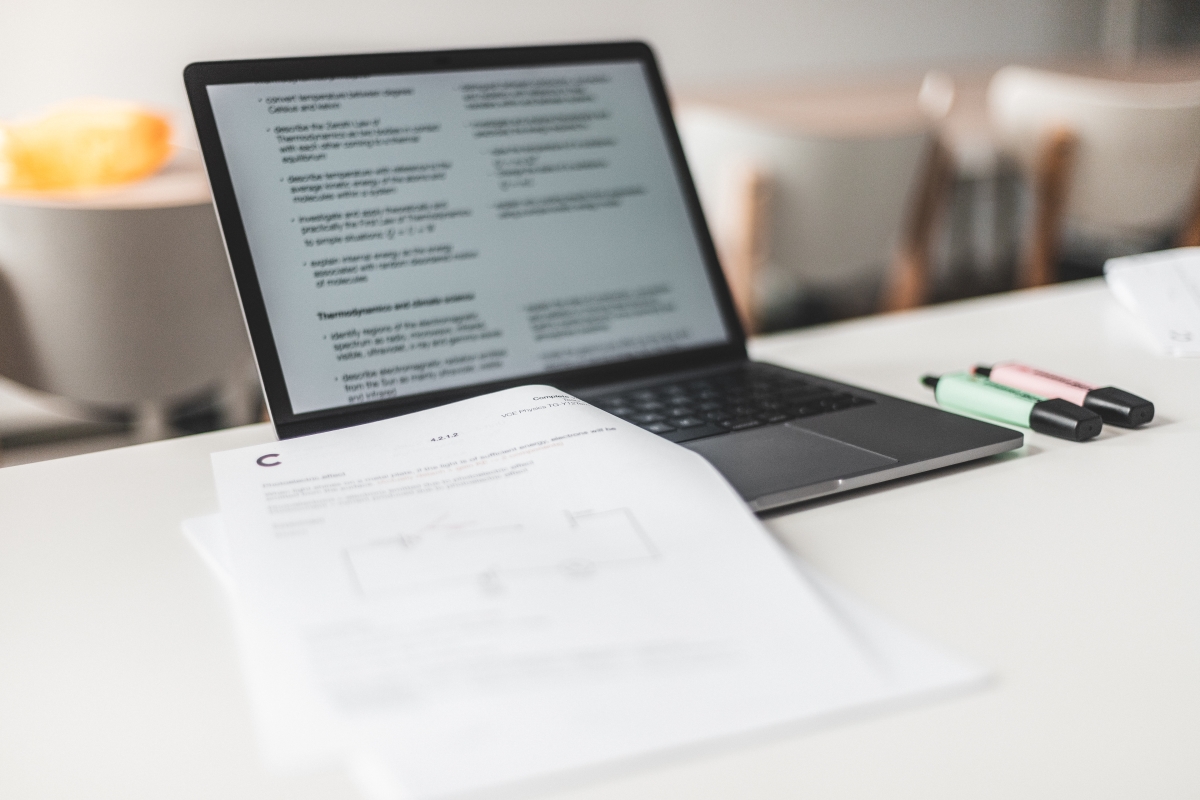
VCE Resources - Practicals
Reliability, Validity, and Accuracy of Experiments
In your VCE Physics practical, you will be tested on your ability to conduct experiments and analyse results. To do so, it is important to understand the concepts of validity, reliability, accuracy, and precision .

VCE Resources - AOS Materials
VCE Physics Unit 3 AoS 2 Resources - Fields Introduction
Finding fields frustrating? Simply want a head-start advantage? Look no further than our tailor-made, free introduction to Unit 3 Area of Study 2 - Fields, written by our expert VCE Physics tutors!

VCE Resources - AOS Materials
VCE Physics Unit 3 AoS 1 - Motion Introduction
Are you making a mess of motion? Our completely free, comprehensive introduction to U3A1 created by expert tutor Asel can help guide your way through this extensive topic.

VCE Resources - AOS Materials
VCE Physics Unit 4 AoS 1 Light, Matter and Special Relativity: Essential Revision Materials
Puzzled by the dual wave-particle nature of light and matter? Bewildered by the fact that length and time can be different for different observers? Our detailed U4A1 introduction, summary, formula sheet and diagnostic quizzes, crafted by expert tutors Asel, Logan and Sav, will help illuminate these complex concepts.

VCE Resources - AOS Materials
VCE Physics Unit 2 AoS 1 - Motion and Mechanics: Full Summary
Forces leaving you baffled? Torque getting your head spinning? Our free U2A1 summary crafted by expert tutors Asel and Logan can help reinforce these concepts, empowering you with the tools needed to tackle the most complex motion application questions.

VCE Resources - AOS Materials
VCE Physics Unit 1 AoS 2 - Nuclear Physics Full Summary Notes
Struggling with VCE Physics Unit 1 Area of Study 2: Nuclear Physics (Year 11)? From radioactive decay to nuclear stability and fission, our free summary notes simplify every key concept — perfect for revising or building your own cheat sheet.

VCE Resources - AOS Materials
VCE Physics FREE Resources - Unit 3 AoS 2 Fields: Summary Sheet, Cheat Sheet, and Formula Sheet
Download free VCE Physics Unit 3 Area of Study 2 (Fields) SAC prep resources here (Year 12). From field lines to the inverse square law, our notes clarify key concepts in gravitational, electric, and magnetic fields — ideal for mastering U3A2 and preparing your own cheat sheet.

VCE Resources - AOS Materials
VCE Physics FREE Resources - Unit 3 AoS 1 Motion: Diagnostic Quiz
VCE Physics Resources - Unit 3 AoS 1 Motion: Diagnostic Quiz.

VCE Resources - AOS Materials
VCE Physics FREE Resources - Unit 3 AoS 1 Motion. Cheat Sheet, Formula Sheet and AOS Summary Notes
Confused by kinematics? Struggling to apply Newton’s laws? Not sure which equation to use? We've got you covered.

VCE Resources - Practicals
How to Master the VCE Practical Investigation: A Complete Guide
Master your VCE Physics Scientific Investigation SAC (Year 11 & Year 12) with our complete guide. From forming a hypothesis to designing experiments, analysing errors, and building your poster, this step-by-step resource simplifies every stage — perfect for Physics, Chemistry, or Biology.

VCE Resources - Practicals
Reliability, Validity, and Accuracy of Experiments
In your VCE Physics practical, you will be tested on your ability to conduct experiments and analyse results. To do so, it is important to understand the concepts of validity, reliability, accuracy, and precision .

VCE Resources - Challenging Concepts
VCE Physics - The Michelson-Morley Experiment Explained
VCE Physics - A full explanation of the famous "failed experiment" accompanying our YouTube video on the same.

VCE Resources - Samples
Complete Bible - FREE VCE Physics Motion/Kinematics Resource
Want to be rank 1 for the first Year 12 VCE Physics SAC? Looking to revise for your Unit 2 Motion SAC? The Complete Bible has you covered.

VCE Resources - Samples
VCE Physics FREE Resources: U3A1 Motion Differentiator Question. Can you solve this difficult Q?
A glimpse at the challenging "differentiator questions" we use in our enrichment class - tailored towards high-achieving students.


-2.jpeg)
